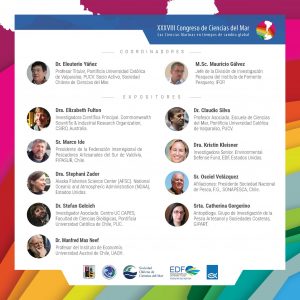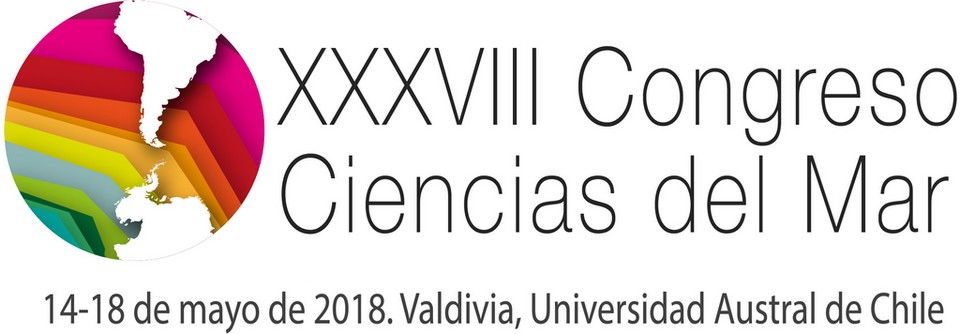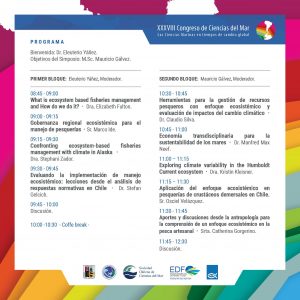Fisheries Management Ecosystemic Approacho takes over the Month of the Sea activities
May 8th, 2018International Symposium will be held on May 18th in the framework of the XXXVIII Marine Sciences Congress , in Valdivia.
Fisheries Development Institute (IFOP) fisheries research agenda this year has been marked by the Ecosystemic Approach to Fisheries Management concept (EEMP). As a high point of these discussions IFOP with Environmental Defend Fund (EDF) will hold an International Symposium on May 18th at the XXXVIII Congress of Marine Sciences, in Valdivia.
As is traditional, issues related to our sea become relevant during May. The subjects on Oceans conservation and sustainability of activities that use their resources are multiple, and they go from marine trash to Climatic Change and its effects in oceans. However, a concept that encompasses all of them and that has the implicit promise of sustainability is the Ecosystemic Approach in activities management or administration that make use of oceans.
Aware of that, Fisheries Development Institute (IFOP) is strengthening its research lines and strategic alliances to provide relevant advice to national authorities for Ecosystemic Approach to Fisheries Management implementation (EEMP). A relevant activity that IFOP is organizing together with Environmental Defend Fund (EDF) is the International Symposium “Ecosystemic Approach for Chilean Fisheries Management in a Climate Change Context” that will be held on May 18th in the framework of the XXXVIII Congress of Marine Sciences, in Valdivia.
Mauricio Gálvez, head of IFOP Fisheries Research Division, tells us “we have considered it very important to hold this International Symposium with EDF in order to learn about different views on how it is understood and how the EEMP should be applied; from international to local experience, from the industrial to the artisan perspective, and from different disciplines perspective “. And he adds “in this way we hope to end up with diverse elements that allow to identify the existing gaps in our country in this matter, to then plan the way to address them based on medium and long-term work programs”.
This working approach, although IFOP has been addressing it in different areas of its work, is not an easy task to change the paradigm, from a monospecific approach, with which research and fisheries management has been addressed, not only in Chile but worldwide, and then move to a multispecific and multisectorial approach, which entails structural changes in the organization of work with multidisciplinary teams, not only in IFOP but also in universities and we are public related to the sector in the country.
In this framework, the challenge of developing this Symposium has been raised, whose moderators will be Dr. Eleuterio Yáñez, from the Pontifical Catholic University of Valparaíso, and IFOP head of the Fisheries Research Division . Among the speakers who will present their vision will be Dr. Beth Fulton (CSIRO), Marco Ide (FIPASUR), Dr. Stephani Zador (NOAA), Dr. Stefan Gelcich (CAPES, PUC), Dr. Claudio Silva (PUCV), Dr. Manfred Max Neef (UACh), Dr. Kristin Kleisner (EDF), Osciel Velázquez (SONAPESCA), and the anthropologist Catherina Gorgerino (GIPART).
With this wide variety of visions it is expected to contribute to identify institutional, legal or normative gaps that hinder the development of research for the application of the EEMP in a context of Climate Change. Subsequently, on the afternoon of May 18, the discussions will continue in a more specific workshop and where it will aim to build a proposal for (i) definition and scope of fisheries research and management with an ecosystem approach in Chile; (ii) identification of fishing management questions to be solved through research with an ecosystemic approach; and (iii) actions and lines of research to be developed to answer such questions.
Gálvez advances other initiatives along the same lines: “These symposiums and workshops are important milestones, but that’s not all. We are executing two projects, one national and one international, on how to make the EEMP operational in Chile and the research that is required. The first covers some benthic fisheries, while the second is more general in nature and we are executing it together with equivalent research institutes in Australia, India and the United States. “

